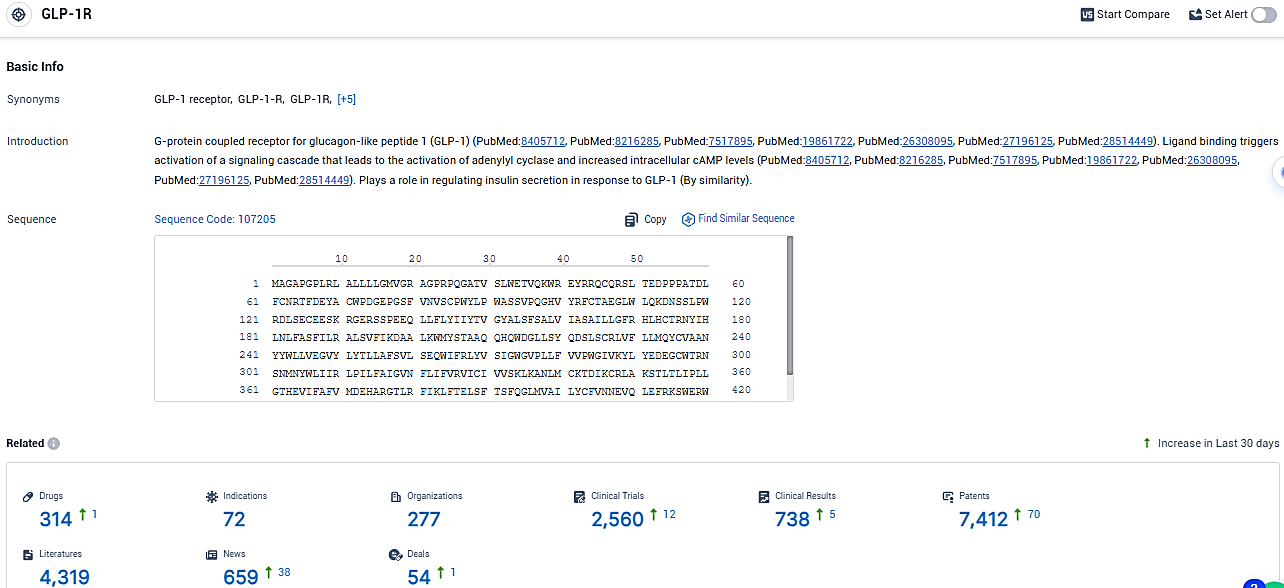Sciwind Biosciences Reports Positive Early Results for Long-Acting GLP-1 Analog Ecnoglutide (XW003) in Phase 3 Trial with Chinese Type 2 Diabetes Patients
Sciwind Biosciences Co., Ltd., an enterprise operating in the clinical phase dedicated to the inception and progression of novel treatments targeting metabolic disorders, has recently disclosed encouraging preliminary outcomes of a Phase 3 study. This trial evaluated the efficacy of ecnoglutide (XW003) among adult patients in China who are afflicted with type 2 diabetes. Ecnoglutide presents as a durable, selectively cAMP-pathway-activating, glucagon-like peptide-1 (GLP-1) mimic, currently under development for managing type 2 diabetes and excess weight.
👇Please click on the image below to directly access the latest data (R&D Status | Core Patent | Clinical Trial | Approval status in Global countries) of this drug.
The third phase of clinical testing for ecnoglutide involved a structured, concealed, and placebo-regulated experiment that incorporated 211 individuals across 33 different locations within China. The study targeted individuals suffering from T2DM whose condition remained poorly managed despite following dietary and physical activity guidelines. The subjects were divided into groups where they were administered either ecnoglutide at two dosage levels (0.6 mg or 1.2 mg) or a placebo. These were provided through weekly injection courses over a span of half a year, which included phases of gradually increasing the dose.
Upon reaching the 24-week milestone, analyses were performed to assess the efficacy of ecnoglutide against the placebo. Subsequently, subjects had the opportunity to partake in an open-label extension using ecnoglutide for an additional 28 weeks at either of the predetermined dosage strengths. During this inquiry, the impacts on average HbA1c, body weight, and BMI were closely monitored, along with an assessment of safety and the ease of adherence to the regimen. At the study’s commencement, the group averaged an HbA1c of 8.5% and a body weight of 73 kg.
Results after the initial 24-week treatment phase indicated that those treated with ecnoglutide experienced significant improvement in HbA1c levels. A notable segment of these patients reached HbA1c levels below 7%, with a substantial number also attaining levels beneath 5.7%. In addition, a considerable reduction in body weight was observed in the ecnoglutide group. The primary conclusions regarding the effectiveness of the treatment are captured in the summary table presented.
Hai Pan, the Chief Executive Officer at Sciwind Biosciences, expressed satisfaction with the trials, noting the encouraging outcome of the 24-week ecnoglutide treatment, which mirrored the successes found with other GLP-1/GIP analogues like tirzepatide. Pan emphasized the consistency of these results in relation to ecnoglutide’s unique mechanism of action centered around cAMP signaling.
As this ongoing Phase 3 investigation proceeds, with completion aimed for the early part of 2024, ecnoglutide is simultaneously undergoing assessment in two additional Phase 3 studies. These critical trials, which have reached full enrollment, are focused on comparing ecnoglutide with dulaglutide in T2DM cases, as well as testing ecnoglutide against a placebo in subjects experiencing excess weight or obesity. These pivotal studies are anticipated to reveal their findings in the latter half of 2024.
👇Please click on the picture link below for free registration or login directly if you have freemium accounts, you can browse the latest research progress on drugs, indications, organizations, clinical trials, clinical results, and drug patents related to this target.
According to the data provided by the Synapse Database, As of January 6, 2024, there are 314 investigational drugs for the GLP-1 target, including 72 indications, 277 R&D institutions involved, with related clinical trials reaching 2560, and as many as 7412 patents.
Ecnoglutide is a novel, cAMP signaling biased, long-acting GLP-1 analogue optimized for improved biological activity, cost-effective manufacturing, and once weekly dosing. XW003 has demonstrated treatment benefits for patients with type 2 diabetes and obesity and is safe and well tolerated in completed clinical studies.






